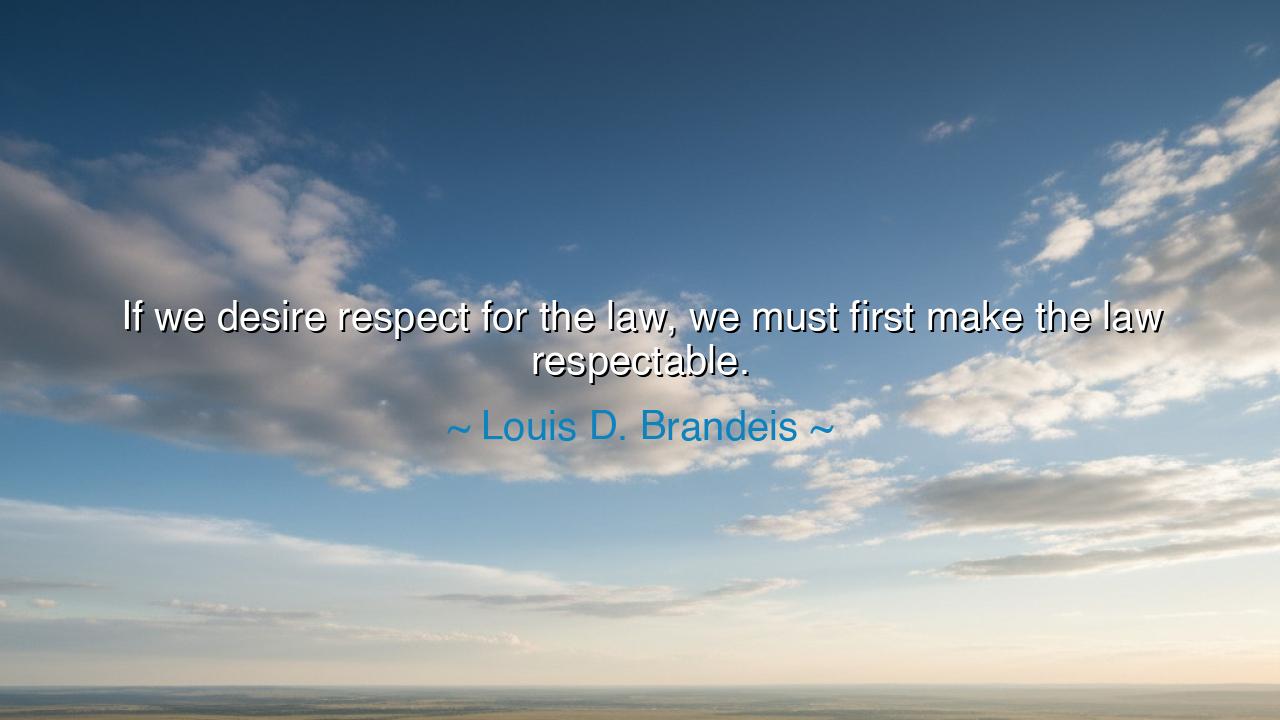
If we desire respect for the law, we must first make the law






The words of Louis D. Brandeis, “If we desire respect for the law, we must first make the law respectable,” shine with the stern clarity of truth. They speak to the eternal bond between ruler and ruled, between justice and obedience. For no people will honor laws that are crooked, cruel, or corrupted. No citizen will bow to decrees that mock fairness or trample dignity. Brandeis, a wise judge of the United States Supreme Court, gave voice to the ancient lesson: respect cannot be demanded—it must be earned.
The origin of this declaration is found in the age of reform, when America wrestled with inequality, corruption, and the power of unchecked wealth. Brandeis, known as the “People’s Lawyer,” saw that the strength of democracy rested not in lofty speeches but in the everyday fairness of its laws. If the law was twisted to favor the few and crush the many, it would lose its sacredness, and rebellion would smolder in the hearts of the people. His words were not mere theory, but the hard-earned wisdom of a man who battled to make justice real in the lives of ordinary citizens.
History is filled with examples that prove this truth. Consider the fate of Prohibition in the United States. In 1920, the law forbade the sale of alcohol, but it was a law disconnected from the will of the people and riddled with hypocrisy. Instead of respect, it bred contempt. Bootleggers thrived, crime syndicates flourished, and ordinary citizens broke the law in secret. Why? Because the law had not been made respectable; it was seen as an intrusion, a decree that served moral zeal more than true justice. In time, the people demanded repeal, and the lesson was etched in memory: a law without respect cannot endure.
Yet Brandeis’s words are not merely a warning; they are also a call to action. To make the law respectable means to craft it with wisdom, fairness, and compassion. It means that lawmakers must not serve only the powerful, but must serve the widow, the worker, the child, and the stranger at the gate. It means that justice must not be blind only in symbol, but must be blind in truth—treating rich and poor, strong and weak, with equal weight. When the people see this, their hearts bend willingly to the law, for they know it protects them rather than enslaves them.
The deeper meaning is that the health of a nation lies not in the force of its armies or the wealth of its coffers, but in the trust its people place in its laws. A nation may wield great power, but if its laws are corrupt, its foundation is sand, destined to crumble. Conversely, even a small nation can endure if its laws are just, for its people will defend them as they would defend their own families. Respectable laws create unity; corrupt laws sow division and rebellion.
The lesson we must carry is this: demand integrity in the laws that govern us. Do not accept decrees that harm the innocent or exalt the selfish. As citizens, raise your voices when laws are unjust, and as leaders, craft laws that honor human dignity. In your own lives, live by this same principle: if you wish respect from others, act in ways that are respectable. The law of the household, the workplace, the community—these too must be fair, or they will be ignored.
So let Brandeis’s words endure as a guiding flame: “If we desire respect for the law, we must first make the law respectable.” They remind us that justice is not maintained by fear but by honor, not by punishment but by trust. Let each generation strive to cleanse corruption, to refine justice, and to build laws worthy of reverence. For when laws are made respectable, the people will walk not in chains, but in dignity, under the shelter of justice that is both firm and fair.






AAdministratorAdministrator
Welcome, honored guests. Please leave a comment, we will respond soon